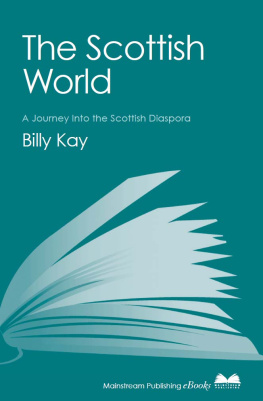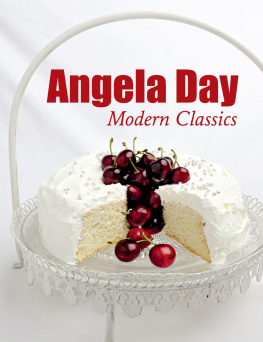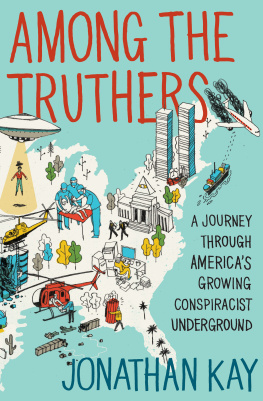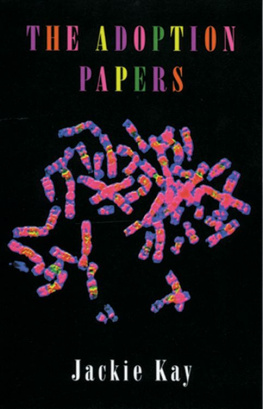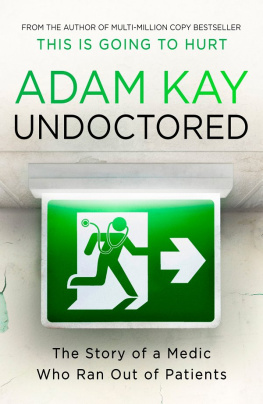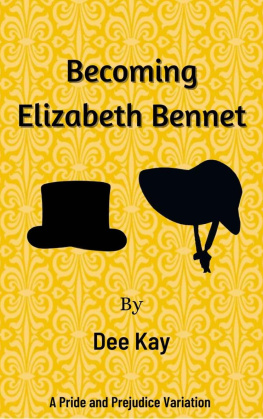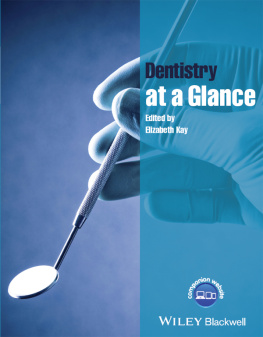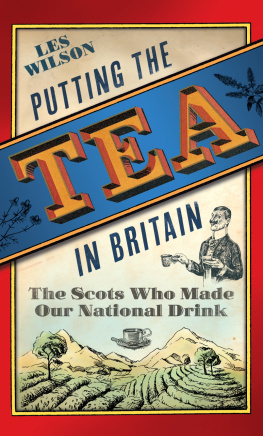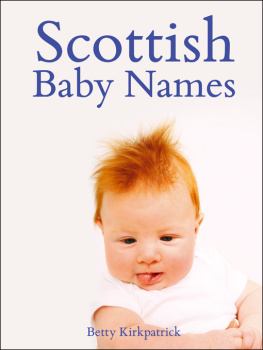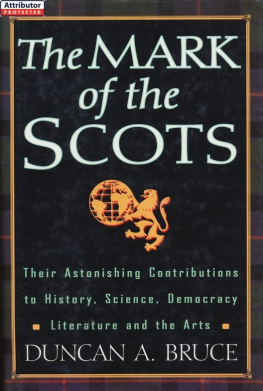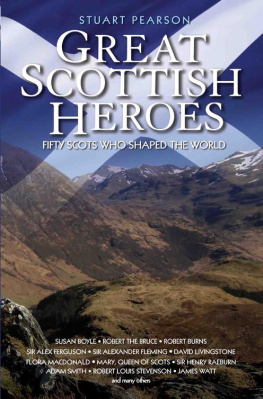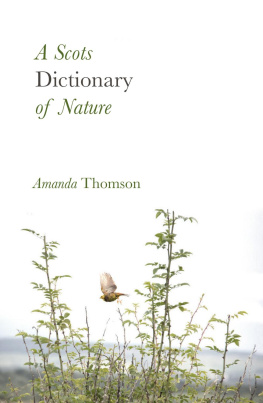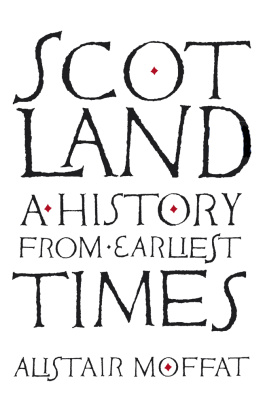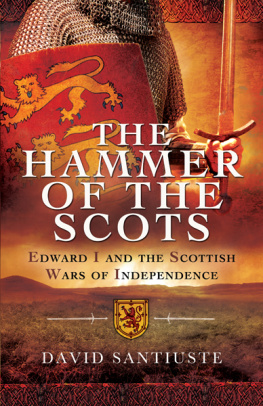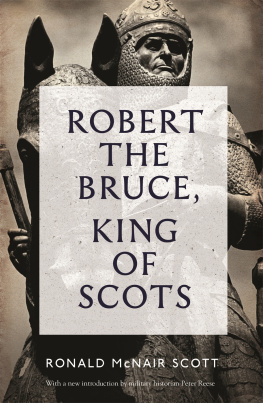THE SCOTTISH WORLD
A Journey into the Scottish Diaspora
Billy Kay
This eBook is copyright material and must not be copied, reproduced, transferred, distributed, leased, licenced or publicly performed or used in any way except as specifically permitted in writing by the publishers, as allowed under the terms and conditions under which it was purchased or as strictly permitted by applicable copyright law. Any unauthorised distribution or use of this text may be a direct infringement of the authors and publishers rights and those responsible may be liable in law accordingly.
Epub ISBN: 9781780574011
Version 1.0
www.mainstreampublishing.com
This edition, 2008
Copyright Billy Kay, 2006
All rights reserved
The moral right of the author has been asserted
First published in Great Britain in 2006 by
MAINSTREAM PUBLISHING COMPANY (EDINBURGH) LTD
7 Albany Street
Edinburgh EH1 3UG
ISBN 9781845963170
No part of this book may be reproduced or transmitted in any form or by any other means without permission in writing from the publisher, except by a reviewer who wishes to quote brief passages in connection with a review written for insertion in a magazine, newspaper or broadcast
A catalogue record for this book is available from the British Library
Acknowledgements
I should like to thank the following people for their help, advice and contribution of material for the book: colleagues Mike Shaw, Caroline Adam, Jane Fowler and former heads of Radio Scotland, James Boyle and Maggie Cunningham, who commissioned the companion radio series broadcast on BBC Scotland; P.H. Scott; Walter Elliot; Linde Lunney; James Robertson; Charles Bruce, Carlos Arredondo, Jane Stabler, James Drummond Bone, David Purdie, Drew Clegg; Professor Andrew Walls, T. Jack Thompson, Rev. Andrew Ross, Colin Cameron; Iain A.D. Stewart; Rennie McOwan; Ian Landles; Murdo Macdonald; Alex Murdoch; Steve Murdoch; Alexia Grosjean; Tom Devine; Carolyn Pidgeon; Paul Mounsey; George MacDonald Fraser; Ellie McDonald; Alison McDonald; Allan Macinnes; Anders Simonsen; Bertil Andersen; Martin Fritz; Ken MacKenzie; Julian Hutchings; Marian Douglas; Jean Annand; Bill Campbell, my companion on the big trip; Bill Murray; Tom ONeill; Jim Mair; Ian Findlay; Cailean Maclean; Bill Caudill; Fiona Ritchie; Syd House; David Hancock; Richard McBrearty of the Scottish Football Museum; Morven Collington Santos of New Destiny, Brazil: www.ndaventura.org; Bob Cooper, Mark Tabbert, David Stevenson, Margaret Jacob, Travis Walker, Jeff Holt, Lord Elgin; Mindi Reid; Ardis Dreisbach Grosjean; Sharon Mair and Jeff Zycinski; my editor, Ailsa Bathgate, and the staff of Mainstream Publishing; my wife, Joo, son, Euan, and daughters, Joanna and Catriona, for their support.
PROLOGUE
Fit Tae Gang Ower the Warld
Bangkok, Thailand, 4 January 1975
It was hot and cloyingly humid as my friend Bill Campbell and I penetrated deeper into a Bangkok ghetto, clutching an address scribbled down hastily following a chance encounter on an Edinburgh street. The surroundings were unprepossessing; the adults looked at us with indifference or hostility, and the children pointed, stared and followed us, shouting, Farang, farang foreigner, foreigner. With our backpacks, beards and long hair, we looked like aliens to the Thai children, and as we trudged on, and the streets seemed to become poorer and poorer, we felt very much strangers in a strange land.
In the previous few days, we had been back in the caller air of a Scottish winter, celebrating Hogmanay and Neerday, and using the energy we had left to throw a farewell party for friends in our Edinburgh flat. The day before departure, Bill had run into an acquaintance on the street. When he told her that we were about to set off on a years travels, beginning with a student flight to Bangkok, she said that she had been at Cambridge University with a student from Thailand and proceeded to copy out his address and scribble a wee note for him. This is why we found ourselves in the back streets of Bangkok. They reminded me of the medina in Fez in Morocco, where every medieval alleyway seemed to have its own occupation, be it leather tanners, wool dyers or tinsmiths. The streets around Rong Muang were slightly wider, and the occupations undertaken there more modern, but the principle was the same, with every family sharing limited space with workshops where motorbikes and scooters were repaired. The street was lined with concertina doors that were raised up to reveal workspaces so tiny that the repairs were carried out on the pavement, the families themselves squeezed into rooms above.
So there we were, jet lagged and wabbit, our lugs ringing with the din and clash of hammer on metal, looking for the address of someone we had never met. We were quite sure that even if the contact was there, the most he would be able to do would be to give advice about somewhere to stay, as the street in which we found ourselves was very obviously a place where people struggled to survive and get by there was neither the space nor the means to provide hospitality.
When we eventually found the address, it was with a degree of trepidation that we rang the bell on the wall. It seemed to me to ring far away, and while we waited for a response, I noticed that we were beside a much larger gate, which was then opened by a beautiful little nine-year-old girl with dark almond-shaped eyes. She beckoned us inside, and we realised that the other narrow houses and workshops on the street formed part of an enclosing wall. We walked through the pend, and, to my astonishment, after the noise and overcrowding and chaos outside, we were now in a haven of peace and tranquillity. Behind the gate was a tropical garden draped with languid Siamese cats. In the centre was an imposing mansion made of teak wood in the traditional Thai style with a roof that curled elegantly upward in the eaves; on either side of that were two smaller matching houses in the same style. In front of the main veranda, taking afternoon tea at a table specially set in the garden, were the Tingsabadh family. The young man we had been sent to find, Charit, spoke impeccable English and invited us to sit down and join them for tea and New Years cake. He read the note passed on by his Cambridge friend, and his mother, Mrs Tingsabadh, asked us where we came from. We said we were from Scotland, we had recently finished our degrees at Edinburgh University, had worked and saved some money and were now starting out on a year of travelling and working our way around the world. Within minutes, Mrs Tingsabadh had conferred with her son in Thai and announced that we were most welcome and could stay with them as long as we wanted. We were taken aback by such kindness to strangers and sighed inwardly with relief that we did not immediately have to go out and negotiate the welter of Bangkok on our own.
Mrs Tingsabadh became a surrogate mother to us over the next six weeks; through the family we got jobs teaching English to delightful teenage girls; we were given one of the smaller teak houses as our own residence; and we experienced remarkable events such as the moving commemoration for the departed soul of a grandparent by Buddhist monks dressed in saffron robes, the most senior of them blessing us with good fortune and longevity as lapsed Calvinists, Bill and I werenae sure we deserved such benison, having spent most of the night in the fleshpots of Patpong, the citys red-light district which thrived as a place of recreation for American soldiers at that time of the Vietnam War. We travelled north to see the hill tribes near Chiang Mai in the Golden Triangle and south to the bamboo huts and beaches of Penang, but we always came back to our home and family in Bangkok.

